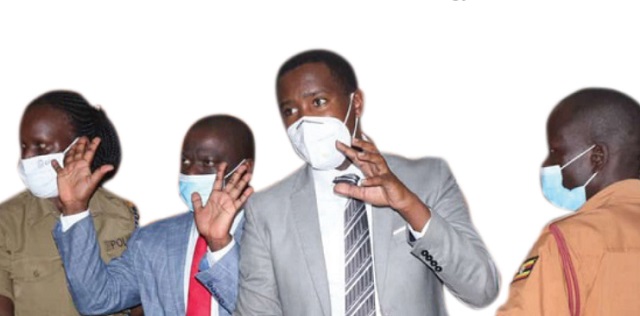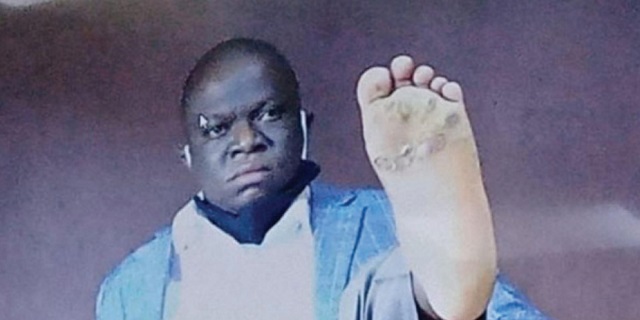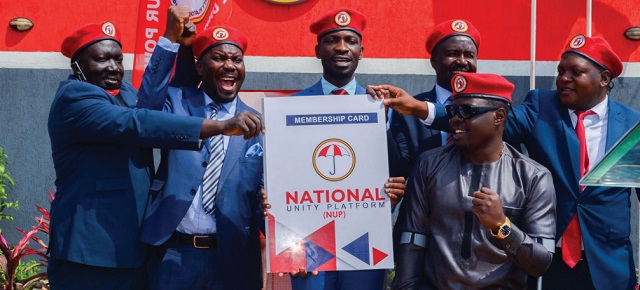
Why torture, harassment of opposition is failed strategy
Kampala, Uganda | IAN KATUSIIME | On October 21 unknown attackers using sharp objects slashed the tyres of a car belonging to Kampala Woman MP Shamim Malende of the opposition National Unity Platform (NUP), the bubbling new party pushing for a new political order in the country.
The attack on Malende reportedly happened about 5km away from the Masaka High Court where her colleagues, fellow MPs and NUP stalwarts, Muhammad Ssegirinya (Kawempe North MP) and Allan Ssewanyana (Makindye West MP) are fighting to get bail against the stated wish of President Yoweri Museveni that they remain in jail.
The slashing of Malende’s car tyres, Ssegirinya and Ssewanyana’s fight for bail, and Museveni’s fight to keep them locked p have since been seen as different strands of Museveni’s grand plan to maintain a stranglehold on the opposition.
When Ssegirinya, who is currently in detention at Murchison Bay in Luzira Maximum Security Prison, appeared for a scheduled bail hearing at Masaka High Court on Oct.21, his arm was wrapped in bandages.
A week earlier, Ssegirinya had revealed horrendous images of torture on his foot while appearing for a bail hearing for the umpteenth time from his jail cell at Kigo Prison. He displayed the deep marks of torture on his foot by video link.
Ssewanyana who appeared the same day in the same court via video link for the same bail hearing looked frail and downcast. He also complained of torture and abuse in his detention at Kigo Prison where he is detained.
Opposition MPs packed the Masaka High Court for the bail hearing of the two MPs who have been on remand for two months now on charges of murder, attempted murder and abetting terrorism. Once again the court postponed the decision on the MPs bail application. They are expected back in court on Oct.25. But few people have high hopes of their release.
Part of the reason for the lack of hope has Museveni’s recent push to have the right to bail for suspected capital offenders scrapped.
“Really! Somebody has killed a person and you see him walking around, that is a provocation I am telling you. It’s a provocation, we can’t accept it,” Museveni said on Sept.28 at the 4th Benedicto Kiwanuka Memorial Lecture in Kampala.
Museveni’s opposition to bail is not new, but the vigour with which he is pursuing it this time appears to have had a chilling effect on the judiciary.
Erias Lukwago, an apposition stalwart and lawyer for Ssewanyana and Ssegirinya has said they are finding roadblocks in having a judge to hear the duo’s bail application.
Lukwago told journalists: “It has now become a hot potato, all the judges are fearing. The law allows them to grant bail, they have already actually granted bail to Ssegirinya and Ssewanyana and they took oath to upload the law, to uphold the Constitution [but] now Mr Museveni wants them to uphold his command. They are in a catch 22 situation, and you can also be picked tomorrow. I’m telling you and I’m assuring you, it never dawned or occurred to Ssegirinya or to Allan that one day they will be in that kind of mess – charged with all sorts of crimes.”
The continued detention and torture of Ssegirinya and Ssewanyana caps almost a year some of the worst human rights violations meted against opposition politicians in Uganda.
The crackdown by the government and security forces has been targeted at NUP; the leading opposition party whose members have been killed, abducted and tortured in numbers. Hundreds of NUP supporters remain unaccounted for since the party was registered by opposition leader Bobi Wine in July 2020.
The campaign for the January 2021 presidential and parliamentary elections was a blood soaked affair where NUP politicians and agents were run over by security cars, shot and rounded up in an attempt to nip in the bud what looked a potent threat for President Museveni and his ruling National Resistance Movement (NRM) at the polls.

The country went to the polls with Bobi Wine’s close allies and hundreds of youthful supporters in jail. An impressive return at the polls by NUP candidates in parliamentary races and local council positions only made the government crackdown worse. Museveni told the nation a month after the elections on February 14 that the Special Forces Command (SFC), his presidential protection unit, was holding some of the detained youths in safe houses.
As an NUP-dominated parliament in the opposition sections got down to business mid-year, the elephant in the room was always the numerous cases of abductions, arrests and torture meted out on party members. The bloody government crackdown of the red branded party has not spared even high ranking NUP MPs like Francis Zaake, who sits on the Parliamentary Commission.
The Commission is the principal organ of parliament and it is chaired by the Speaker. It also has the Minister of Finance as a member. A new rule has just added the Deputy Speaker on the ranks of the Commission.
On Aug. 10, the High Court ordered the government to compensate Zaake with Shs75m for the abuse of his rights when he was arrested by security forces at his home and detained in incommunicado for 10 days. The arrests and torture have not stopped since he was elevated from being a mere backbencher to a member of the Commission. But the torture and harassment appears not to be getting the results the government and its security organs want; chilling opposition against Museveni. And it garners bad publicity for Museveni whenever victims expose their torture wounds to the media either in court or in hospital. Meanwhile the opposition to Museveni is unrelenting.
It appears, therefore, Museveni’s push to have bail scrapped while Ssegirinya and Ssewanyana are desperately pursuing it is being seen as part of a continued onslaught on the NUP by other means. The message to opposition politicians is clear: we will lock you up and throw away the jail key.
On Oct. 15, Justine Nakajumba, Ssegirinya’s mother broke down in tears at the Buganda Road Court when the MP was denied bail again and kept on remand at Kigo.
Until his arrest in September, Ssegirinya was one of the most active MPs, in his constituency. His daily schedule involved donations in his constituency in Kawempe North, visits to a clinic he established and meetings with constituents to do with a saving scheme he had started.
Ssegirinya’s Twitter page which was a hive of activity with updates from the MP has also since gone mute since a murder charge came howling. “This must be a case of mistaken identity,” Ssegirinya said on one of his last days as a free man when he was summoned by police to Masaka.
The NUP leader Bobi Wine visited the two MPs on Oct. 18 at Kigo Prison. “They are alive but they are in pain especially the Hon. Ssegirinya,” Bobi Wine told journalists after he emerged from the prison building two hours later. He was in the company of NUP Secretary General David Lewis Rubongoya and NUP spokesperson Joel Ssenyonyi.
As the two MPs are locked up facing torture, the cabinet is trying to ram through constitutional amendments to scrap bail for those accused of murder and similar capital offences.
Social media blockade
It was only until this week that Turkish-based vlogger Fred Lumbuye, an avowed NUP supporter, was released after three months of detention. Since he was released, Lumbuye has kept an uncharacteristically low profile without outing any videos of him talking about his tormentors as would be expected.
The vlogger gained prominence in August with his no holds barred YouTube videos announcing President Museveni’s passing on. After a clandestine operation of how government agents got to him, he went silent with speculation that he was being tortured and held incommunicado. Party officials and lawyers could not trace him at the time of his disappearance.
His release was overshadowed by the continued detention of Ssegirinya and Ssewanyana but it happened in the backdrop of the dragnet the government has placed on NUP and its adherents, far and wide.
Lumbuye’s case was also symbolic of the social media blockade government imposed in the run up to the election. Ten months later, the NUP-dominated Facebook is still shut down in Uganda with no letup in sight. Facebook first suspended government linked accounts accusing them of manipulating public debate. The government hit back by creating an internet blackout. Facebook remains a no-go area with the exception of VPN-enabled log-ins.

More torture cases
David Lule, aka Selector Davie, a longtime friend of Bobi Wine, was one of those abducted and tortured in the wave of kidnaps that shook the country this year. On Jan. 12, he went home and in the wee hours of the morning, what he had been warned of earlier- an impending swoop- happened.
Lule was abducted from his home in Kamwokya and whisked off to Chieftaincy of Military Intelligence (CMI) headquarters in Mbuya for interrogation. “They took me from one officer to another, asking unclear questions; what is Bobi planning, what is Plan B? From what I gauged, there was no plan on what to do with people they would abduct,” he told The Independent at the height of the kidnaps.
“I went to Makindye military barracks where there was a daily dose of caning, beating, endless and pointless interrogation,” he says. “They took me to a separate room where I would spend days without eating and could be dragged anytime for beating.”
According to Lule, anyone leaving Makindye military barracks after detention has to undergo treatment because of the physical depredation one went through. He had seen kids who could not walk or chaps who are just left for dead from the barracks.
The military court at Makindye charged Lule with an offence linked to wearing a military cap on November 19, 2020, the day protests broke out in Uganda after the arrest of Bobi Wine in Luuka, at the height of the presidential election campaign.
Legal experts had penned enough literature on the illegality of trying civilians before a military court but the onslaught did not abate.
Unlike a number of his ilk, Lule says he got bail from the court after putting up a spirited case of why he should not be in further detention narrating to the judge, a military man, how he had been through enough horror already at the hands of men dressed like him. “I told him how I had had bled enough, coughed blood, been sick for days and he sort of agreed, he said, “That is how I survived Kitalya.”
“I am not even a NUP mobiliser, I don’t have any position in the party. I have been helping Bobi with his music business which he is not even involved in any more to be honest,” Lule said.
A Twitter hashtag #StopKidnappingUgandans calling out the abuse did little to allay the situation.
Others included Umar Kagimu, a graphics designer who was abducted from his workplace at Nasser Road in Kampala. Uniformed military men ransacked his house and seized computers and other items. “The men told me he (her husband) is involved in politics,” Lydia Kagimu says of the squadron that besieged her house on Jan. 22, eight days after the presidential election.
It was likely Kagimu worked on posters for candidates of NUP, information that could have been picked up by intelligence operatives.
Intelligence and security operatives were rounding up anyone remotely close to Bobi Wine or displaying red banners, associated with the People Movement and NUP. For those lesser known but actively involved in politics, the playbook was not any different.
Two aspiring politicians in Mpigi district, People Power heartland; Abdul Rashid Nkinga and Ronald Sekajja, went missing in early January, Daily Monitor reported.
Nkinga was aspiring mayor for Buwama Town Council in Mpigi while Sekajja was running as chairperson for Buwama sub-county. Their relatives and supporters received the news with shock. According to the report, Katonga regional police said they did not know who was behind the kidnappings and appealed for information from the public.
Nkinga was declared winner of the mayoral race for Buwama Town council in spite of being a no show in his locale. Almost all his associates are reported missing; from a driver to anyone who supported his campaign either through providing a public address system, posters, venue or supply of People Power branded T-shirts.
****
 The Independent Uganda: You get the Truth we Pay the Price
The Independent Uganda: You get the Truth we Pay the Price






Bwana mhariri ( Mr editor), we have a Swahili saying tenda wema nenda zako (do good and move on)- this is a tremendous article to assert your ‘independence’.
We have known about the regime and the secret torture, which is now in the open for the whole world to see and witness. The magnificent exhibition by our EA friends at Dubai 2020 says much about moving forward!